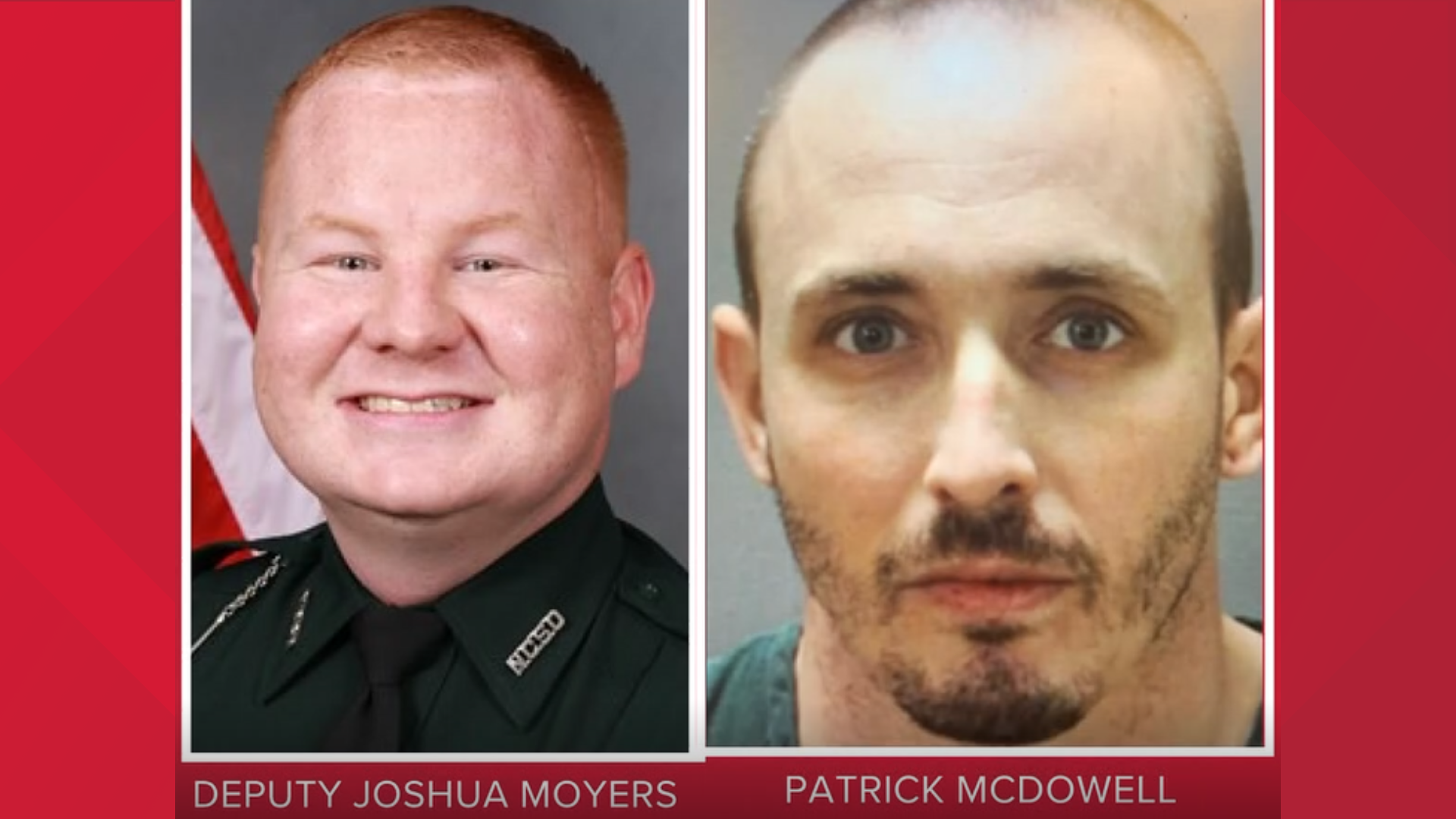NASSAU COUNTY, Fla — The defense rested their case Wednesday morning in the penalty phase of the death penalty trial for a man who murdered a Nassau County Sheriff's deputy.
Patrick McDowell confessed to shooting and killing Deputy Joshua Moyers during a traffic stop in 2021. On Tuesday, defense attorneys called two doctors to the witness stand who testified they believe McDowell was experiencing both post-traumatic stress disorder from his time serving in two Iraqi war zones and psychosis due to a meth "binge" when he murdered Moyers.
Testimony began Wednesday with another doctor, a forensic psychiatrist. Dr. Mikel Matto explained to jurors that PTSD changes the brain and has to do with the level of fear someone has experienced. He explained to jurors why people with PTSD may also have substance abuse issues.
Matto testified as doctors did Tuesday, that he believes PTSD had a "casual connection" to Moyers's shooting.
“He appeared to be operating in this heightened, fight or flight instinct at the time of the actual shooting," Matto testified. "He appeared to be perceiving this situation in a way in which everything was very much life or death. He reacted in a very quick manner. All of these are consistent with the sort of fight or flight response to PTSD.”
Defense Attorney Alan Chipperfield asked Matto about McDowell telling the passenger in his stolen van after the shooting that "it was him or me."
"It’s another example of something that was factually incorrect, in my opinion," Matto responded. "It wasn’t ‘him or me,’ despite Patrick’s view. There wasn’t going to be a consequence in which either Deputy Moyers or Mr. McDowell had to die.”
Chipperfield asked Matto if the fact McDowell fired three shots showed premeditation. Matto said because, in the police dash camera video, one shot was followed by two more shots within only a few seconds, "that, to me, doesn't imply reflection."
Prosecutors argued McDowell never said he was in a life or death situation and did not describe symptoms of PTSD when he testified in his own defense last week.
Prosecutor Mark Caliel argued McDowell never said Moyers posed a life or death threat to him, but did say he posed the threat of incarceration because he could have been arrested due to a warrant out of Georgia. McDowell testified he shot Moyers because he was willing to do whatever he needed, to not go back to jail.
Jurors appeared attentive during this testimony, some of them taking notes during the psychiatrist's testimony. A number of both Moyers and McDowell's family members were in the courtroom.
The defense's second and final witness was McDowell's paternal grandfather, a retired Navy captain. Defense attorneys showed the jury photos of McDowell as a child getting to go on a trip on his grandfather's Navy ship from one port to another.
McDowell’s grandfather, Peter Winekoop, said it was hard for McDowell to “do anything normal” after his time serving in Iraq. He testified McDowell now knows what’s right and what's wrong and would be able to help other veterans through his own experiences.
Winekoop testified he did not believe he could have done McDowell's job photographing scenes where fellow military members had been killed on duty.
He described Moyers's murder as the worst thing he could imagine.
“My wife and I have been praying for the Moyers family ever since it happened," Winekoop testified. "It’s hard to take what’s happened even in the last couple weeks. We’re so sorry.”
During cross-examination, prosecutors argued Winekoop believed what McDowell told him about his time in Iraq because he wanted to believe his grandson. Winekoop said he witnessed the effects of the trauma McDowell endured.
After the defense rested, prosecutors called a clinical psychologist, Dr. John Mundt. He countered what the previous three doctors, who were called by the defense, said.
Mundt testified he did not believe McDowell was in fight or flight mode when he shot Moyers, because fight or flight involves an instantaneous "flush" of adrenaline in a few milliseconds. He said police dashboard camera video showed Moyers and McDowell interacting for six minutes before Moyers's murder and Moyers never acted aggressively.
Mundt also testified he does not believe there is evidence McDowell was experiencing PTSD during the murder, as doctors called by the defense believe. He said he does believe meth played a role.
Prosecutors asked him what he believed the motive of the murder was.
“I think it’s actually very clear," Mundt answered. "He was desperate not to go back to jail.”
The judge expects closing arguments to take place Thursday. The case will then go to the jury to decide whether McDowell lives.

